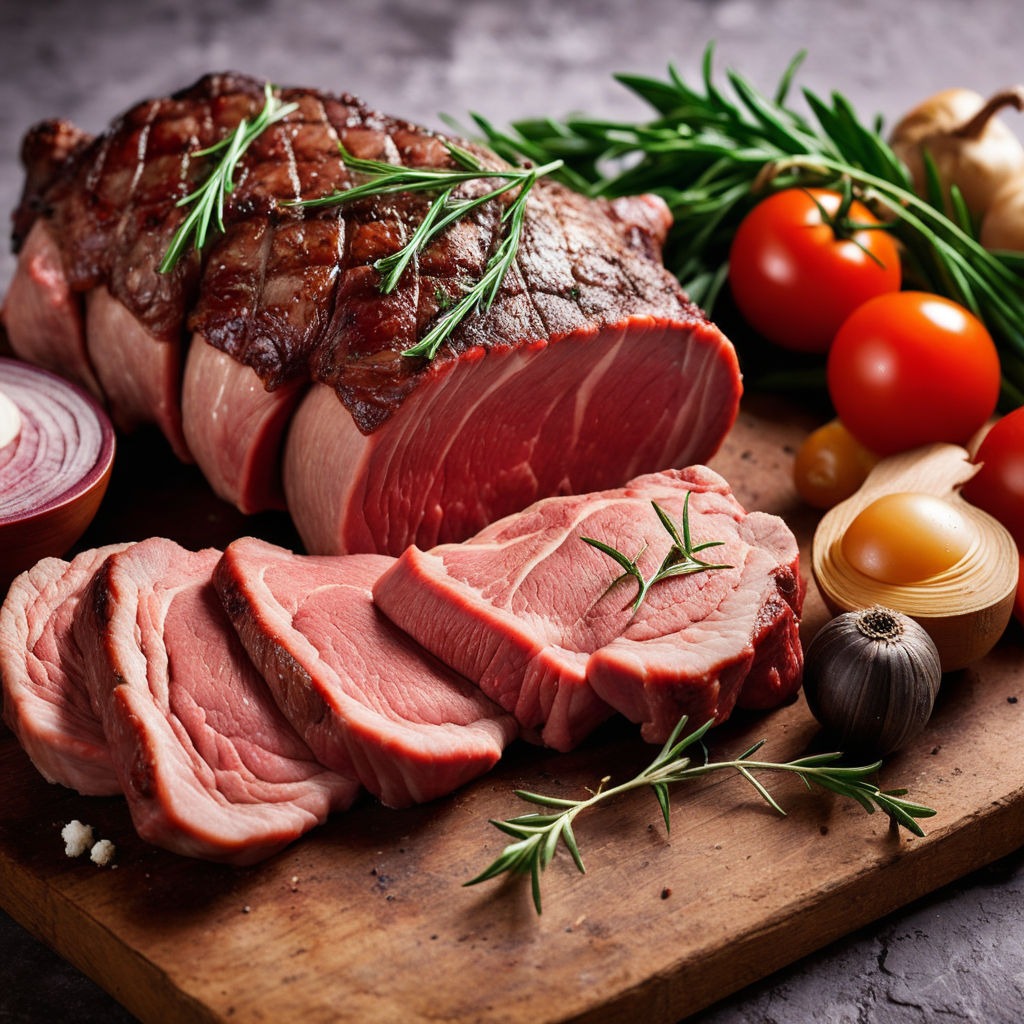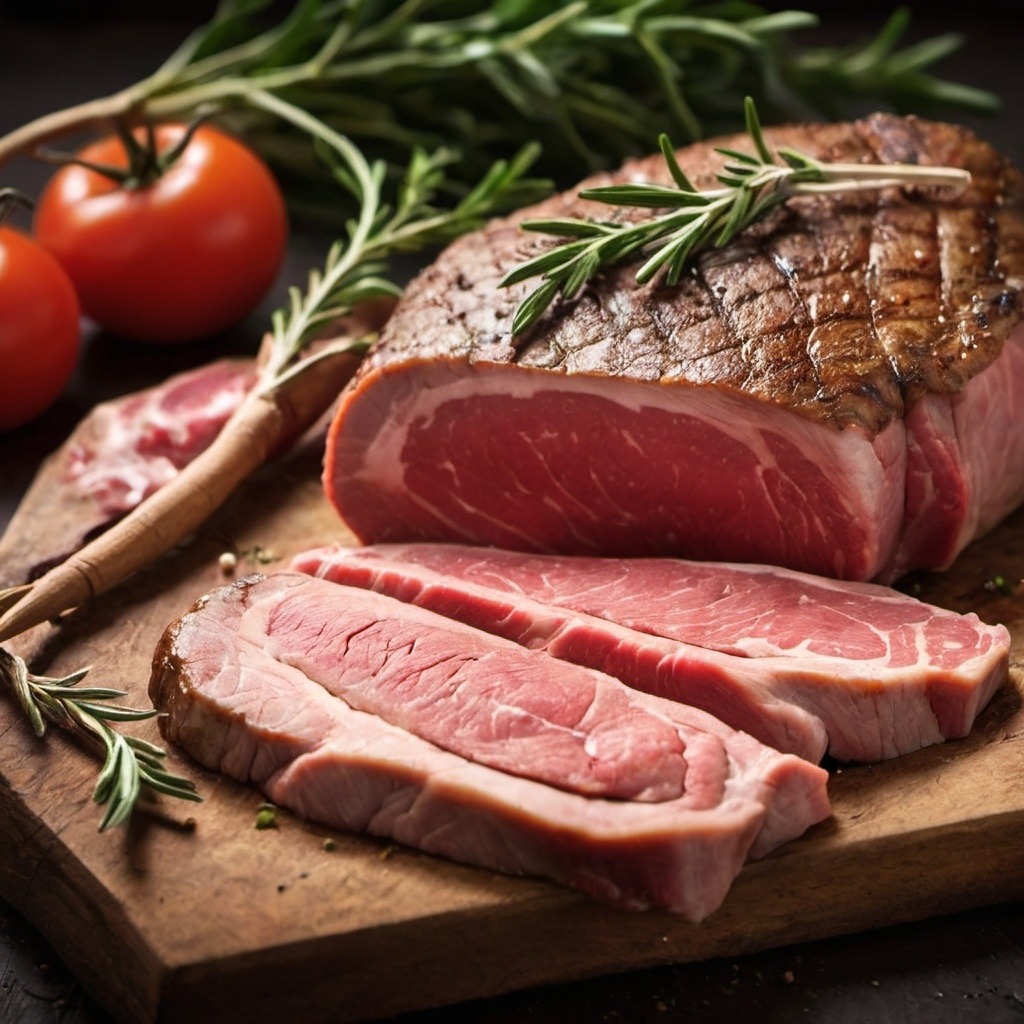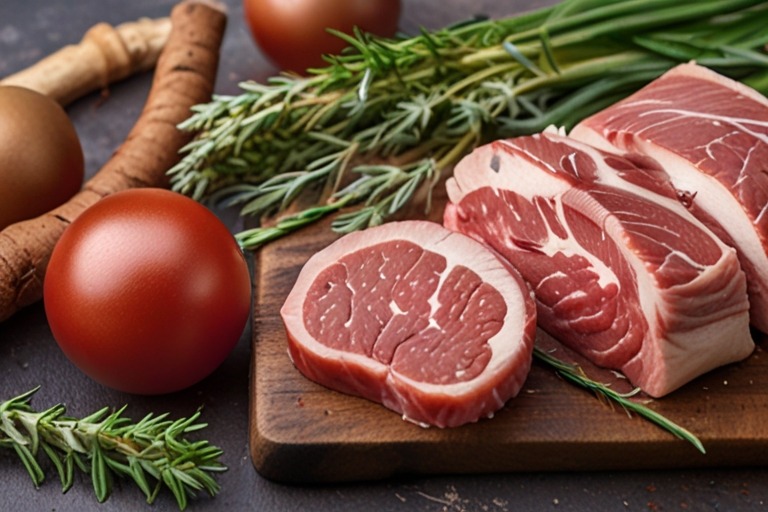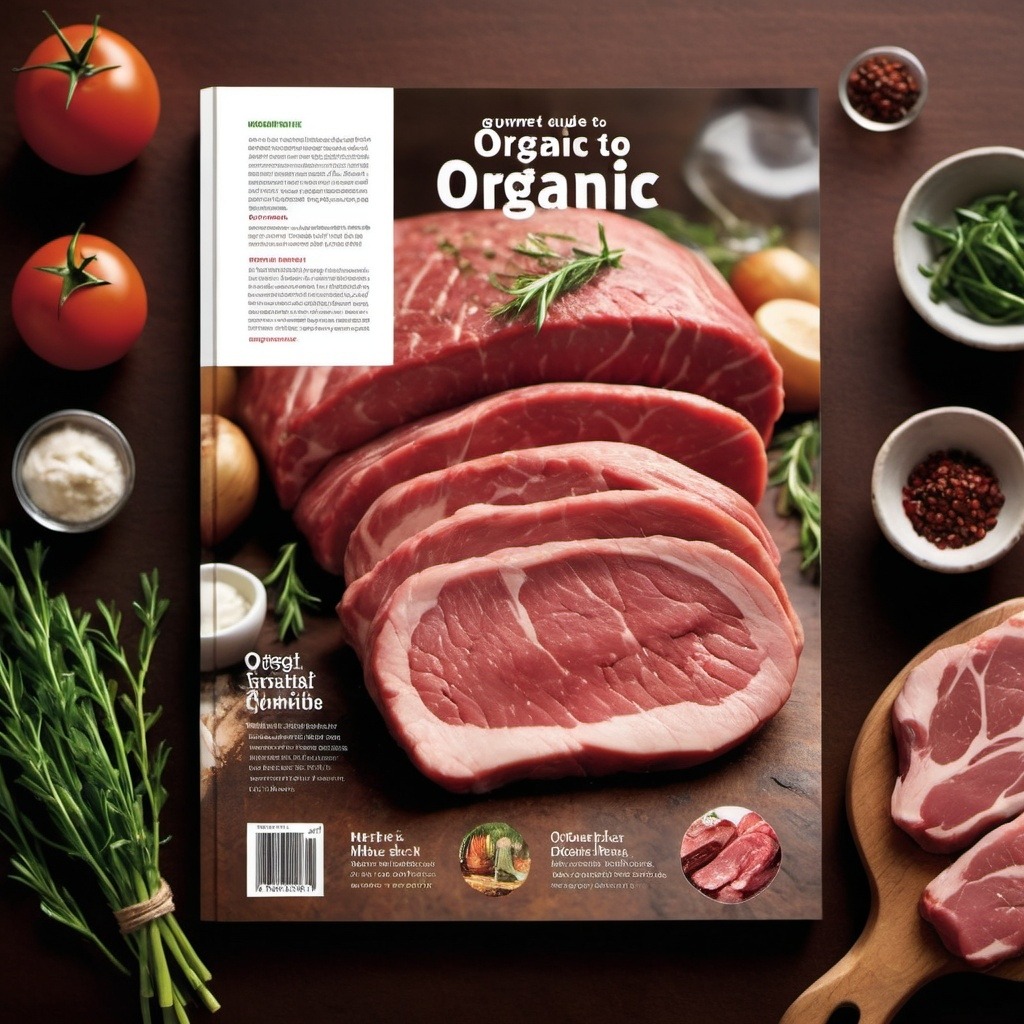
The Rise of Organic Meat
In recent years, the demand for organic meat has experienced a significant surge. More consumers are becoming aware of the health benefits and environmental impact of their dietary choices, leading them to seek out meat that is not only nutritious but also sustainably sourced. This shift in consumer behavior is part of a broader trend towards more conscious eating habits, where the origin and quality of food take precedence over convenience and cost.
Organic meat is celebrated for its purity and the stringent standards it adheres to. Unlike conventional meat, which often comes from animals raised with antibiotics and hormones, organic meat comes from animals that are raised in more humane conditions and fed organic feed. This distinction ensures that the meat is free from synthetic additives and chemicals, making it a healthier option for consumers. Furthermore, organic farming practices promote animal welfare and environmental sustainability, addressing the concerns of those who are mindful of their ecological footprint.
Knowing your meat sources is crucial in today’s food landscape. With numerous reports of food contamination and unethical farming practices, consumers are increasingly wary of the origins of their meat. By opting for organic meat suppliers, they can be assured of the quality and safety of their food. These suppliers are often transparent about their farming methods, providing detailed information about the animal’s diet, living conditions, and the overall farming process.
This transparency not only builds trust but also allows consumers to make informed decisions that align with their values and health goals.
For more information on the benefits of organic meat and to find reputable suppliers, visit Organic Trade Association.
What Makes Meat Organic?
Definition and Standards of Organic Meat
Organic meat is defined by strict regulatory standards that ensure the meat comes from animals raised in accordance with specific practices promoting health and sustainability. According to the USDA, for meat to be labeled organic, it must come from animals that are fed organic feed, are not given antibiotics or growth hormones, and have access to the outdoors. The farming practices must also support biodiversity and environmental health, avoiding synthetic pesticides and fertilizers.
The journey to organic certification is rigorous, involving annual inspections and detailed documentation. Organic farms must demonstrate their adherence to these standards consistently, ensuring that every step of the production process, from animal husbandry to feed production, meets the established criteria.
Benefits of Choosing Organic Over Conventional Meat
Choosing organic meat over conventional options offers a myriad of benefits, impacting not only personal health but also the environment and animal welfare. One of the primary advantages is the reduced exposure to harmful chemicals. Since organic meat comes from animals raised without synthetic pesticides, antibiotics, or hormones, consumers are less likely to ingest these substances, which have been linked to various health issues.
Nutritionally, organic meat often boasts higher levels of beneficial nutrients. Studies have shown that organic meat can contain more omega-3 fatty acids, which are crucial for heart health, compared to conventional meat. Additionally, organic livestock is typically raised on pasture, leading to meat that is leaner and richer in antioxidants.
From an environmental perspective, organic farming practices contribute significantly to sustainability. Organic farms prioritize soil health, water conservation, and the reduction of pollution. By avoiding synthetic chemicals and employing crop rotation and composting, these farms enhance soil fertility and reduce the risk of contamination to nearby ecosystems.
Animal welfare is another critical benefit. Organic standards mandate that animals have access to the outdoors and are raised in environments that allow for natural behaviors. This humane treatment contrasts sharply with the often overcrowded and stressful conditions found in conventional meat production.
In conclusion, choosing organic meat supports a more sustainable, ethical, and health-conscious food system. For further details on organic standards and the benefits of organic meat, you can visit the USDA Organic website.
Top Organic Meat Suppliers in the Market

ButcherBox
ButcherBox is a national supplier known for its commitment to delivering high-quality, grass-fed organic meat directly to consumers’ doors. They offer a variety of meat products, including beef, pork, and chicken, all sourced from farms that meet stringent organic and humane standards.
ButcherBox focuses on providing meat free from antibiotics and hormones, ensuring that every product is not only delicious but also ethically sourced.
Applegate Farms
Applegate Farms is a widely recognized name in the organic meat industry, providing a range of products that include deli meats, sausages, bacon, and hot dogs. Their commitment to natural and organic practices ensures that their meat is free from artificial ingredients and preservatives. Applegate sources from farms that emphasize animal welfare, ensuring that animals are raised humanely and without the use of antibiotics or hormones.
White Oak Pastures
Located in Bluffton, Georgia, White Oak Pastures is a family-owned farm that has been practicing regenerative agriculture for over 150 years. They offer a wide range of organic meats, including beef, pork, poultry, and lamb. White Oak Pastures is renowned for its sustainable farming practices, which not only produce high-quality meat but also enhance soil health and biodiversity. Their commitment to transparency and quality makes them a standout supplier in the organic meat market.
Creekstone Farms
Creekstone Farms, based in Arkansas City, Kansas, is a national supplier known for its premium organic beef and pork. They emphasize humane animal treatment and sustainable farming practices. Creekstone Farms’ products are USDA certified organic, ensuring that the meat is raised without synthetic chemicals, antibiotics, or hormones. Their dedication to quality and sustainability has earned them a loyal customer base.
Primal Pastures
Primal Pastures is a local supplier based in Southern California, specializing in pasture-raised, organic meat. They offer a variety of products, including chicken, beef, lamb, and pork, all raised on organic feed and in humane conditions. Primal Pastures focuses on regenerative agriculture practices, ensuring that their farming methods are sustainable and environmentally friendly.
Their local approach allows them to provide fresh, high-quality meat to their customers.
Thousand Hills Lifetime Grazed
Thousand Hills Lifetime Grazed is a national supplier based in Minnesota, known for its commitment to 100% grass-fed and finished beef. They source from family farms that practice regenerative agriculture, ensuring that the meat is not only organic but also contributes to soil health and ecosystem sustainability. Thousand Hills’ products are free from antibiotics, hormones, and GMOs, offering consumers a healthy and ethical meat option.
Choosing any of these reputable organic meat suppliers ensures that you are supporting sustainable farming practices, humane animal treatment, and consuming high-quality, nutritious meat. For more information on organic meat suppliers, you can visit the Organic Trade Association.
Understanding the Labels: Grass-Fed vs. Grain-Fed
Explanation of Different Feeding Practices
When shopping for meat, especially ground beef, you might come across labels like “grass-fed” and “grain-fed.” Understanding these terms is crucial to making informed purchasing decisions. Grass-fed beef comes from cattle that have been raised on a diet primarily consisting of grass and other foraged foods throughout their lives. This feeding practice aligns closely with the natural diet of cattle, promoting better health for the animals and producing beef that many consider more natural and nutritious.
On the other hand, grain-fed beef comes from cattle that are primarily fed grains, such as corn and soy, especially during the latter part of their lives. This practice is common in conventional meat production as it promotes faster growth and weight gain, allowing farmers to produce meat more efficiently.
How These Practices Affect the Quality and Taste of Meat

The feeding practices have a significant impact on the quality, taste, and nutritional profile of the meat. Grass-fed beef is often touted for its higher levels of omega-3 fatty acids, antioxidants, and vitamins compared to grain-fed beef. This nutritional edge makes grass-fed beef a great choice for health-conscious consumers. Additionally, grass-fed beef typically has a leaner texture and a more robust, earthy flavor that many people find appealing.
Grain-fed beef, conversely, tends to be higher in overall fat content, which can make the meat more tender and flavorful due to the marbling of fat throughout the cuts. This characteristic is often preferred by those who enjoy a richer, juicier taste. However, this higher fat content also means more saturated fats, which might be a consideration for those monitoring their fat intake.
When deciding whether to buy grass-fed or grain-fed beef, it’s also worth considering the environmental and ethical implications. Grass-fed beef production is generally more sustainable and environmentally friendly, as it promotes better land use and reduces the need for chemical inputs. Moreover, the more natural diet and living conditions of grass-fed cattle align better with animal welfare standards.
For those looking to integrate grass-fed beef into their diet, there are several great options. You can find a variety of cuts and ground beef from local farmers’ markets, specialty butcher shops, and even through online subscription services that deliver high-quality grass-fed beef directly to your door. These subscriptions are particularly convenient for those who want to ensure a steady supply of nutritious and ethically sourced meat.
Whether you’re looking for ground beef for your favorite recipes or premium cuts for special occasions, opting for grass-fed beef can enhance your culinary experience while supporting sustainable farming practices. For more detailed information on the benefits of grass-fed beef, visit EatWild.
The Health Benefits of Organic Meat
Nutritional Advantages
Organic meat offers a variety of nutritional benefits that make it a healthier choice compared to conventional meat. One of the primary advantages is the absence of synthetic additives, antibiotics, and hormones, which are often used in conventional meat production. This absence ensures that consumers are not exposed to potentially harmful substances that could have adverse health effects over time.
Organic meat, especially grass-fed varieties, tends to have a better nutritional profile. It is typically higher in essential nutrients like omega-3 fatty acids, which are crucial for heart health and reducing inflammation. Omega-3s are known for their role in supporting brain function and overall cardiovascular health. Additionally, organic meat often contains higher levels of antioxidants such as vitamin E, which helps protect the body from oxidative stress and supports immune function.
Studies have also shown that organic meat has a higher concentration of conjugated linoleic acid (CLA), a type of fat that has been linked to numerous health benefits, including reduced risk of heart disease and improved metabolic health. Furthermore, organic meat is generally leaner, which can contribute to better weight management and lower intake of saturated fats.
Studies and Expert Opinions Supporting Organic Meat Consumption
Numerous studies and expert opinions support the consumption of organic meat due to its health benefits. A study published in the British Journal of Nutrition found that organic meat contains about 50% more omega-3 fatty acids than conventionally produced meat. This higher content is attributed to the diet of the animals, which includes more grass and forage.
Another study highlighted in the Journal of Agricultural and Food Chemistry found that organic meat has higher antioxidant levels, which can contribute to better overall health and reduced risk of chronic diseases. These antioxidants play a critical role in neutralizing harmful free radicals in the body, thereby reducing oxidative stress and inflammation.
Experts in the field of nutrition and health also advocate for the consumption of organic meat. Dr. Michael Greger, a well-known physician and author, emphasizes the importance of choosing organic products to avoid the intake of harmful chemicals and support overall well-being.
Similarly, nutritionist and author Marion Nestle has highlighted the benefits of organic meat in terms of nutrient density and reduced exposure to antibiotics and hormones.
Moreover, the American Heart Association recommends consuming lean meat with a favorable fatty acid profile, such as grass-fed organic meat, to support heart health. This recommendation aligns with the findings of various studies that point to the nutritional superiority of organic meat.
In conclusion, the health benefits of organic meat are well-supported by scientific research and expert opinions. Its superior nutritional profile, absence of harmful additives, and higher levels of beneficial nutrients make it a wise choice for those looking to improve their diet and overall health. For further reading on the benefits of organic meat, you can explore resources from the British Journal of Nutrition and the Journal of Agricultural and Food Chemistry.
Sustainable Farming Practices
Overview of How Organic Farms Operate

Organic farms operate on principles that prioritize ecological balance, biodiversity, and the health of both the environment and the animals. These farms follow stringent standards set by regulatory bodies such as the USDA, which mandate the use of organic feed, prohibit synthetic chemicals, and require humane treatment of livestock.
At the core of organic farming is the emphasis on natural processes. Organic farmers utilize crop rotation, cover cropping, and composting to maintain soil fertility and health. These practices enhance the soil’s ability to retain water and nutrients, reduce erosion, and promote the growth of beneficial microorganisms. By avoiding synthetic fertilizers and pesticides, organic farms reduce the risk of soil and water contamination, ensuring that the land remains productive and healthy for future generations.
Livestock on organic farms are raised in conditions that allow for natural behaviors. Animals have access to outdoor spaces, where they can graze, roam, and forage. This access not only improves animal welfare but also contributes to a more natural diet, which enhances the nutritional quality of the meat. Organic standards also prohibit the use of antibiotics and growth hormones, ensuring that the animals grow at a natural pace and are not exposed to unnecessary medications.
Environmental Benefits of Organic Meat Production
The environmental benefits of organic meat production are substantial and multifaceted. One of the most significant advantages is the reduction of chemical usage. By avoiding synthetic pesticides and fertilizers, organic farms minimize the pollution of soil, water, and air. This reduction in chemical runoff helps protect local ecosystems and maintains biodiversity.
Organic farming practices also promote soil health, which is critical for sustainable agriculture. Healthy soil acts as a carbon sink, sequestering carbon dioxide from the atmosphere and mitigating the effects of climate change. The use of cover crops and organic matter like compost enriches the soil, improves its structure, and enhances its ability to store carbon. This process not only benefits the environment but also increases the resilience of the farm to extreme weather events, such as droughts and floods.
Water conservation is another key benefit of organic meat production. Organic farms use water more efficiently through practices like mulching, which reduces evaporation, and drip irrigation, which targets water directly to the plants’ roots. These methods help conserve water resources and reduce the impact on local water supplies.
Biodiversity is a cornerstone of organic farming. By avoiding monoculture and promoting diverse crop rotations, organic farms create habitats for a variety of plants, insects, and animals. This biodiversity is crucial for maintaining ecosystem balance and ensuring the resilience of the farm. For instance, beneficial insects can help control pests naturally, reducing the need for chemical interventions.
Additionally, organic meat production supports animal welfare, which has environmental implications. Animals raised in more natural, stress-free environments are healthier and less prone to disease, reducing the need for medical interventions that can have environmental side effects.
In summary, the sustainable farming practices employed by organic farms not only produce healthier, more nutritious meat but also offer significant environmental benefits. These practices contribute to soil health, water conservation, reduced chemical pollution, and enhanced biodiversity. For more insights into the environmental advantages of organic farming, visit the Organic Farming Research Foundation.
Consumer Tips: How to Choose the Best Organic Meat
Factors to Consider When Buying Organic Meat
When selecting organic meat, several factors can help ensure you are making the best choice for your health, taste preferences, and environmental impact.
- Certification: Look for USDA Organic certification or equivalent standards in your country. This certification ensures that the meat adheres to strict organic farming practices, including no use of synthetic chemicals, antibiotics, or hormones.
- Source: Research the farm or supplier. Transparency about farming practices, animal welfare, and environmental impact is a good indicator of quality. Reputable suppliers often provide detailed information about their operations.
- Type of Feed: Opt for meat labeled as “grass-fed” or “pasture-raised.” Grass-fed animals typically have a more natural diet, resulting in higher levels of omega-3 fatty acids and antioxidants. Pasture-raised animals also enjoy more humane living conditions.
- Freshness: Choose meat that is fresh or properly frozen. Fresh meat should have a bright color and firm texture. If buying frozen meat, check for any signs of freezer burn or discoloration.
- Cuts: Select the right cuts based on your cooking method. Different cuts have varying levels of tenderness and flavor. For example, grass-fed ground beef is excellent for burgers, while grass-fed steaks are ideal for grilling or searing.
Tips for Storing and Cooking Organic Meat for Optimal Flavor and Health Storing Organic Meat:
- Refrigeration: Store fresh organic meat in the refrigerator at 32-40°F (0-4°C). Use it within 2-3 days to ensure maximum freshness and prevent spoilage.
- Freezing: For longer storage, freeze organic meat. Wrap it tightly in plastic wrap, aluminum foil, or freezer paper, then place it in a sealed plastic bag. Properly stored, frozen meat can last up to 6-12 months.
- Thawing: Thaw frozen meat in the refrigerator or using the defrost setting on your microwave. Avoid thawing at room temperature to prevent bacterial growth.
Cooking Organic Meat:

- Seasoning: Organic meat often has a more pronounced natural flavor, so simple seasoning with salt, pepper, and herbs can be sufficient. Avoid using too many strong seasonings that might overpower the meat’s natural taste.
- Cooking Temperature: Grass-fed and organic meats tend to be leaner, so they cook faster than conventional meat. Use a meat thermometer to ensure proper cooking without overcooking. Aim for internal temperatures of 145°F (63°C) for beef, pork, lamb, and veal (medium rare), and 165°F (74°C) for poultry.
- Resting: Allow the meat to rest after cooking. This helps retain juices, ensuring the meat remains tender and flavorful. For steaks and roasts, a rest period of 5-10 minutes is ideal.
- Cooking Methods: Choose appropriate cooking methods based on the cut. For example, grass-fed ground beef is best for making burgers, while leaner cuts like sirloin benefit from quick, high-heat cooking methods such as grilling or broiling. Slow cooking or braising is excellent for tougher cuts, enhancing their tenderness and flavor.
By considering these factors and following these tips, you can enjoy the full benefits of organic meat, ensuring it is both delicious and nutritious. For more detailed advice on choosing and cooking organic meat, visit EatWild.
